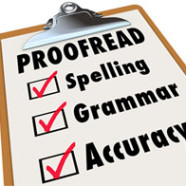
I know you’ll appreciate the humor and valuable advice from Kathy Ide in this article on the importance of punctuation and grammar entitled Let’s Eat Grandma.
Wandering Wednesdays
Have you seen the plaques and T-shirts that say:
Let’s Eat Grandma.
Let’s Eat, Grandma.
Commas Save Lives.
I love that! It shows how one tiny bit of punctuation can change the entire meaning and tone of a sentence.
You may think that as long as you’ve got life-changing content in your nonfiction manuscript, or an intriguing story with lots of conflict and interesting characters in your fiction manuscript, that should be enough. And yes, content and story are extremely important. But no matter how good those things are, you’ll be running some pretty big risks if you don’t bother proofreading your manuscript carefully for typos, inaccuracies, and inconsistencies … and learning the industry-standard rules regarding punctuation, usage, grammar, and spelling.
OK, you won’t be putting your grandmother’s life on the line or joining a tribe of cannibals. But tiny mistakes in your writing can have disastrous consequences. Here are my top ten:
- Mechanical errors can decrease your chance of acceptance by a traditional publisher.
- Mechanical errors can cause miscommunication.
- Mechanical errors can cause confusion.
- Mechanical errors can give an unprofessional appearance to publishers and readers.
- Mechanical errors can be embarrassing.
- Mechanical errors may cause readers to take you and your message less seriously.
- Mechanical errors can affect the sales of your book.
- Mechanical errors could cost you money.
- Mechanical errors can be distracting.
- Mechanical errors can give you a poor reputation.
Professionalism Is Key
If you’re writing just for family and friends, it may not matter so much whether every comma is in exactly the right place or if you have a few typos here and there. But if you want to get your book published in today’s highly competitive commercial market, you need every edge you can get. If you expect people to buy what you write, you need to take the time to do it right.
If you have a hard time finding typos, inconsistencies, and “PUGS” errors in your writing, consider hiring a professional proofreader. If you go to www.ChristianEditor.com and fill out the form for Authors Seeking Editors, you’ll be connected with established, professional editors who can make your manuscript shine.
A comma may not save Grandma’s life. But a careful proofread might make a life-or-death difference for your manuscript.
Kathy Ide, author of Proofreading Secrets of Best-Selling Authors, is a full-time freelance editor/mentor for new writers, established authors, and book publishers. She speaks at writers’ conferences across the country. She is the founder and director of The Christian PEN: Proofreaders and Editors Network and the Christian Editor Network. For more about Kathy, visit www.KathyIde.com.










Love this. Punctuation and grammar are two of my biggies. When I read/review for authors, I hope I am doing them a favor when I share with them what I have found that doesn’t make sense. I cringe over some of the stuff I find in our world today regarding grammar. Oh well, one does what one can. Thank you for sharing.
Thanks for sharing, Robin. I cringe over today’s grammar too! Nice to meet a “kindred spirit.” 🙂
I enjoyed the article, and am in total agreement. I’ve given up on some authors because of punctuation and grammar. We all make mistakes, and I try to give anyone the benefit of the doubt, but if find the same issues in a third book by an author that were in the first, I’m done. Thanks for sharing!
You’re more patient than I am, Felicia. I give up on a book with too many mistakes by about the third page! 🙂 It’s just really hard for me to get into the story or the message of the book with errors jumping off the page at me.